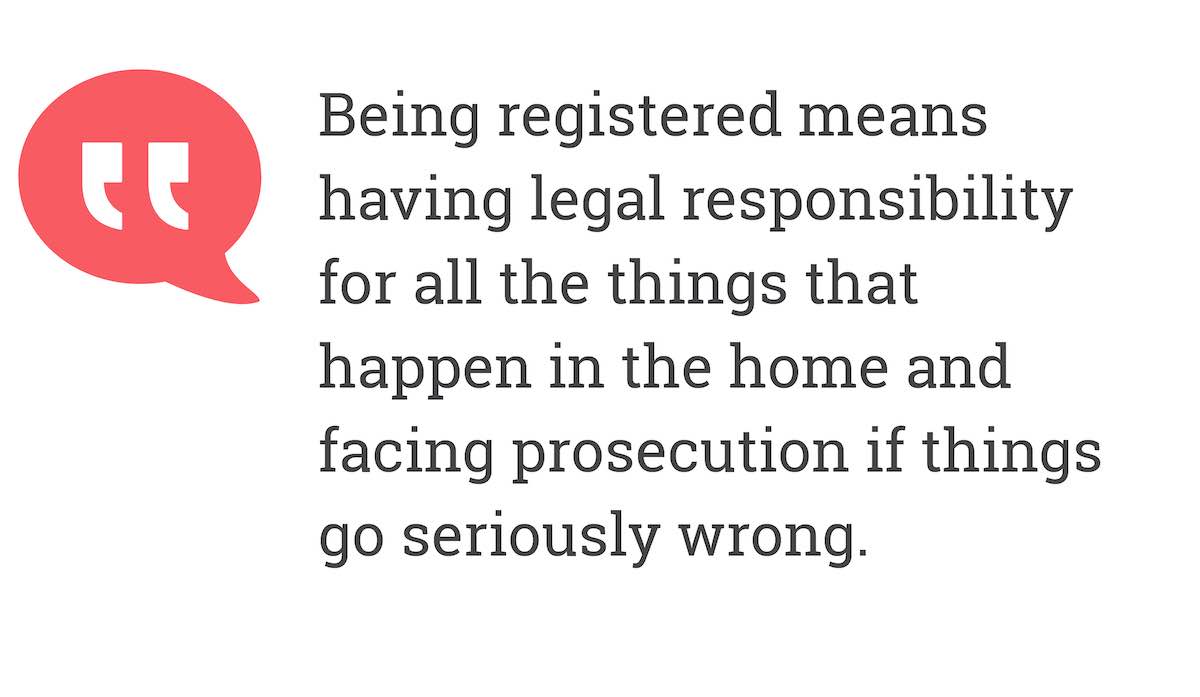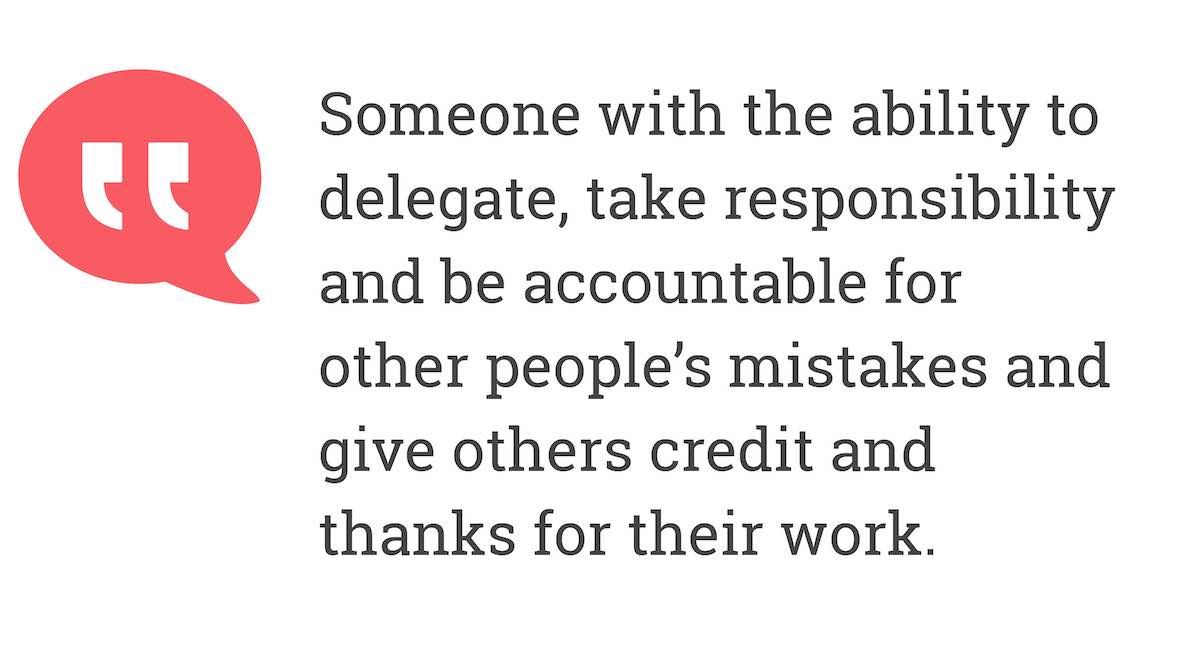 How I Started My Career As A Carer And Became A Registered Home Manager
How I Started My Career As A Carer And Became A Registered Home Manager10 Sept 2020 ● Virginia Irvine, Quality Support Advisor
How I Started My Career As A Carer And Became A Registered Home Manager
 "I moved into management because I thought it would enable me to help more people to receive a better quality of care."
"I moved into management because I thought it would enable me to help more people to receive a better quality of care."Former Carer & Registered Home Manager, Virginia, outlines her career journey from retail to Home Management, with experience based tips on how you can carve out your own career in Social Care.
Topics covered in this article
When Did I Decide I Wanted To Be A Registered Home Manager?
First Steps To Becoming A Registered Home Manager
What Qualifications Does A Registered Home Manager Need?
My First Post As A Registered Home Manager
What To Expect From Your Job As A Registered Home Manager
What Does A Typical Day For A Registered Home Manager Look Like?
What Salary Expectations Should Someone Have For Their First Job As A Registered Home Manager?
What Is The Average Pay For An Experienced Registered Home Manager?
What Kind Of Settings Do Registered Home Manager Work In?
What Keeps Me Excited About Being A Registered Home Manager?
What Are The Challenges Faced By A Registered Home Manager?
What Kind Of Person Makes A Good Registered Home Manager? (key soft / personal skills)
What Are The Career Opportunities For An Experienced Registered Home Manager?
How Do You Deal With The Emotions Of The Job?
My Registered Home Manager Interview Advice
My Registered Home Manager CV Writing Advice
Introduction
I left school with basic level qualifications and worked in retail.
While working as a manager of a charity shop, I gave a young lady with learning disabilities a work experience opportunity.
I found it challenging but her mother told me that I had enabled her daughter to get a paid job.
It made me realise I could be doing something better with my life.
My First Job In Care
My first job in care was working in the local hospital as what is now known as a Healthcare Assistant.
My husband saw my potential and encouraged me to educate myself.
I thought about nursing but with no relevant qualifications and the need to earn money this was not an option.
Working 12-hour shifts gave me spare time to do agency work and through this experience I decided to move into social care, stepping up to a Senior Carer.
Becoming A Senior Home Carer
As a Senior Home Carer, I was accepted on a part-time HNC course.
My first session was nearly my last, I cried outside the room, too frightened to go in, I remembered my school experience and thought I was too stupid for college.
The course leader came out and encouraged me to join the other learners, also feeling like me.
In the first year of a two-year course, I became pregnant, one of 5 in a class of 11, mentioned in the local paper under the heading ‘carers course so productive’.
I nearly gave up the course, but the course leader allowed my baby in the class, so I juggled working full-time, the demands of a being new mum and studying.
After achieving the HNC, I moved into management because I thought it would enable me to help more people to receive a better quality of care.
It was not right for me at the time, so based on my positive experience of further education, I moved to work in educating others.
This led to my role of Quality and Business Process Manager for the County Council.
When Did I Decide I Wanted To Be A Registered Home Manager?
Changes in Government led to budget cuts in the County Council and along with many of my colleagues I found myself redundant.
It was scary due to the loss of income, but the greatest impact was on my confidence.
As so many people were leaving the Council at the same time as me, there was a lot of competition for jobs.
After numerous rejections from roles at my expected salary level, I returned to teaching and assessing, which was less pay, but it was something I felt confident to do.
During this time, I also had a stomach ulcer and gall-bladder complications, with hospital admissions.
I felt my life had turned upside down and my sickness absence would impact on me getting a higher-level post.
It took a lot to motivate myself to think positively and I decided to list what I could offer an employer.
I had fond memories of working as a Senior Carer and started looking at options that involved direct care, which is when I decided I wanted to be a Registered Manager.
First Steps To Becoming A Registered Home Manager
I applied for several Registered Manager jobs in residential homes, went for interviews, and had rejections.
I then saw a Registered Manager role in a nursing home, close to where we lived.I researched the role, contacted CQC and established that I could be possibly gain registration of a nursing home without a nursing qualification.
About a week after sending me the application pack, the operational manager phoned, and we had a chat.
This led to a successful interview and job offer, reliant on me gaining registration with CQC within an agreed period.
What Qualifications Does A Registered Home Manager Need?
CQC look for relevant qualifications and experience, which evidence ability or potential to meet the requirements of the role, including social work, nursing and health and social care vocational qualifications at level 4 or above.
CQC accepted my Level 7 leadership and management, Degree in post compulsory education and Level 4 HNC in Caring Services.
I became Registered Manager and later gained the Level 5 Diploma in Leadership for Health and Social Care as CPD (Continual Professional Development).
My First Post As A Registered Home Manager
Wow! It was the hardest job I had ever done.
I had worked in the Council telling manager’s and staff in care homes what they should do but doing it was very different.
My first focus as Registered Manager was evidencing our work, so CQC could see we were meeting legal requirements, which we were able to achieve within around three months.
I went on to change the culture from a medical to a social care model, challenging people to think differently and allowing people to have control of their lives.
My learning curve was like climbing a mountain, I faced a lot of challenges but ultimately, I led by example and eventually things started to change.
I knew I was making a difference when a 96-year-old lady told me she had been living in the home for 7 years and I had let her off her chain!
Gaining Experience
Care Assistant roles and training in the hospital and social services gave me the foundations I needed to understand how to care for people.
Assessing and teaching in further education built on previous knowledge and taught me national competencies, so I understood requirements of all levels of staff from apprentices to the manager.
The quality and business process role taught me how to work with a wide range of stakeholders, quality and compliance, interpretation of legislation, governance, and accountability.
My retail experience has also been useful for selling services and ideas to people.
I have developed experience managing staff over many years and I am still learning.
I have also learned how to cook on a commercial basis with some critical feedback from a group of over 80-year-olds, I soon learned the importance of heated plates when serving food.
What To Expect From Your Job As A Registered Home Manager
At a basic level, managing a care home is like running any home.
It needs to be clean, comfortable, and safe for everyone to live their day-to-day lives.
There are bills to pay, regular maintenance, special events to celebrate, times of sadness and hopefully lots of fun and laughter.

At a professional level, being registered means having legal responsibility for all the things that happen in the home and facing prosecution if things go seriously wrong.
Meeting legal requirements and managing the expectations of all stakeholders can be stressful and is very demanding.
The role involves a lot of listening, communication with a wide range of people and building effective working relationships with residents, their families, staff, and other professionals.
It is important to have a working knowledge of medical conditions and medication, care management, health and safety, training and development, employment law and, to be aware of anything that could lead to prosecution, to protect own role and the organisation.
Ultimately, people living and working in the home are reliant on the Registered Manager keeping the business viable through ensuring legal requirements are met and resources are managed effectively.
In my opinion doing the job well will provide evidence to CQC that the service is good or outstanding.
What Does A Typical Day For A Registered Home Manager Look Like?
Firstly, to find out what the current risks are and what may impact on the quality of the service.
This is often done by reading handover notes from the previous shift or getting a verbal hand over from staff.
A walk around of the home provides an opportunity to speak to residents and staff and identify anything that may need to be addressed.
Many homes have a morning catch up meeting with the senior team, so everyone knows what is going on and people agree actions for the day.
Emails need to be read and responded to and any related tasks prioritised and delegated as appropriate.
There is always budget monitoring and a plan of work to be completed during the month including staff and resident meetings, reports to head office and audits covering things such as fire safety, care management, medication administration etc, so this needs to be actioned.
In a small home the manager will probably need to do staff rotas, audits, supervisions, appraisals etc.
In a large home senior staff will probably do these and the manager will review them.
The manager will need to review accidents and incidents and ensure action is taken to keep people safe.
There could also be reporting to the local authority and CQC, depending on what has been happening in the home.
There may be meetings to attend, telephone calls to answer, complaints to deal with and anything else needed.
What Salary Expectations Should Someone Have For Their First Job As A Registered Home Manager?
Often salary is based on the size of the home and related responsibilities.
A first role could be anything between 20k to 30k.
What Is The Average Pay For An Experienced Registered Home Manager?
The average salaries are around 35k but there are possibilities to earn a lot more in a larger care home.
What Kind Of Settings Do Registered Home Manager Work In?
Care homes for older people needing personal care, people living with dementia or people with nursing needs, care homes for children, supported living homes for vulnerable adults including people living with learning disabilities and services providing care in peoples own homes.
What Keeps Me Excited About Being A Registered Home Manager?
The funny things people say to me, such as a lady who would say ‘that is a nice dress, the sort of dress a lady wears when she takes me out in her car’.
Staff excited about coming to work and going the extra mile to make someone’s day.Seeing people happy and laughing together.
Seeing someone with behaviour that is challenging to others and a staff member knowing that person so well they know how to reduce the anxiety and calm them down.
Knowing that what I do makes a positive difference to people’s lives.
What Are The Challenges Faced By A Registered Home Manager?
Keeping people safe and free from harm.
Juggling demands for time.
Keeping up to date with changes in the law and regulations.
Maintaining occupancy levels to ensure the there is sufficient income to run the business.
Staff absence and the impact of this on the team and people living in the home as well as the budget.
Ensuring staff are competent to do their job role and taking action to hold them to account.
Ensuring staff follow procedures and keep records up to date.
Ensuring there is sufficient evidence to enable CQC to judge the service to be ‘Good’ or ‘Outstanding’.
What Kind Of Person Makes A Good Registered Home Manager? (key soft / personal skills)
Someone open, honest, and reliable, that people can trust.
Someone that speaks up, questions, and reports concerns and challenges when needed.

Someone with the ability to delegate, take responsibility and be accountable for other people’s mistakes and give others credit and thanks for their work.
Someone self-aware that respects other people, listens and can see other’s viewpoints.
Someone that leads by example and does the right thing.
Someone with emotional intelligence, empathy, and good communication skills with an ability to positively influence others.
Someone that remembers their own journey and helps as many other people as possible to follow their own dreams to succeed at work.
What Are The Career Opportunities For An Experienced Registered Home Manager?
Registered Manager roles in larger homes or roles with responsibility for more than one service, such as Regional Manager, Deputy Director of Care, Area Manager, Operations Manager or Quality and Compliance roles.
How Do You Deal With The Emotions Of The Job?
I am a calm person and it takes a lot to make me angry, I tend to listen and focus on finding common ground.
I go into my ‘professional’ persona when needed, to deal with emotional situations but do find the loss of someone emotional.
At first, I would apologise to staff for getting tearful, but feedback suggests that this helps others to see the real me and allows staff deal with their own feelings.
I deal with stress by listening to music, often very loud.
I put my headphone in and it helps me to focus and recharge.
My Registered Home Manager Interview Advice
Look professional and prepare for the interview, making sure any requirements for interview such as presentations are error free and spell checked.
Research and refresh knowledge to ensure it is up to date.
There is will be questions about the Health and Social Care Act, CQC fundamental standards and the company or organisation giving the interview.
There will be opportunities to describe competence using examples from work history, which should also provide reassurance to the interviewer/s on the likelihood of gaining registration with CQC.
My Registered Home Manager CV Writing Advice
Research the key skills, experience and qualifications needed for the job and include, so employer and agency searches will pick up.
Look at other people’s CVs to get ideas and use online templates.
Be honest, keep it short and simple, so people understand own roles and experience.
Spell check.
Use contacts from agencies and employers as feedback on the CV.
For example, I have assessor and verifier qualifications but when I put these on my CV I get lots of assessor and training jobs sent to me, which I am not interested in, so I only include the qualifications that are relevant to the jobs I am interested in.
Let me know in the comments your thoughts on becoming a Registered Home Manager and what I've said about my journey - let's chat there!
Oh, and please Like this article to let me know you enjoyed it - thank you!


